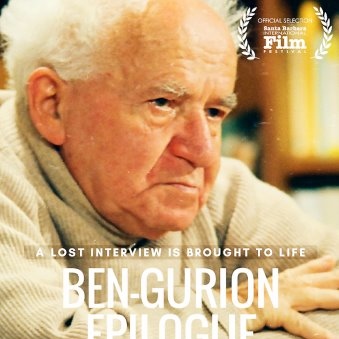click to dowload our latest edition
CLICK HERE TO SUBSCRIBE TO OUR NEWSLETTER


Published
6 years agoon
By
adminPETER FELDMAN
Writer and director Yariv Mozer and award-winning film editor Yael Perlov, uncovered this lost interview by chance. They were busy restoring the feature about Ben-Gurion by Perlov’s late father, David Perlov.
They first found silent film reels. It then took a further six months for them to find the soundtrack, which they did in the Ben-Gurion Archives in the Negev. They married the two and the result is a stirring and enlightening documentary called the David Ben-Gurion Epilogue.
Almost six decades after the filming of the interview, Mozer’s Epilogue film is a sterling revisiting of Ben-Gurion’s opinions and prophecies. The work is interlaced with newsreel and other film archives, radio recordings, and still-photographs. The interviewer, Dr Clinton Bailey, was a recent immigrant to Israel, who had come to live at Kibbutz Sde Boker in the footsteps of Ben-Gurion.
Ben-Gurion was one of the most prominent Zionist leaders in the world and the first prime minister of the State of Israel. He was a visionary, a down-to-earth leader with immense intellect and an ability to communicate his thoughts clearly and concisely.
“The Old Man”, as he was fondly called, is depicted in meetings with foreign leaders, delivering a speech in Israel’s Knesset and celebrating birthdays. The film is described by The New York Times as “a wistful ode to a lost generation of leaders who viewed simplicity as a virtue, even as they strove for giant goals.”
In 1968, when Ben-Gurion was 82, he was living in the seclusion of his home in Sde Bokor in the Negev Desert, a symbol of his devotion to the settlement at the southern reaches of Israel. It was a place where he would live out his days until his death five years later. He was buried next to his beloved wife, Paula.
Ben-Gurion’s home was remote from all political discourse, which allowed him a perspective on the Zionist enterprise. His introspective soul-searching, is the focus of this film, and his reflections provide a surprising vision for today’s crucial decisions and for the future of Israel.
In the interview he says: “The most important thing which I learned, I learned by living here. I want to live in a place when I know that my friends, and myself, we did it! Everything. It’s our creation.”
Last Thursday night, at a Nu Metro cinema in Hyde Park, the SA Zionist Federation and the World Zionist Federation (in association with the Israel centre IUA-UCF) held a special screening of this engrossing documentary.
The film showed how this statesman may have been short in stature, but he stood awesomely tall with his thinking and his philosophical take on the world at the time.
He defined in clear terms his approach to Zionism, his decision to declare a State of Israel on Friday, 5Ilya 5708 (May 14, 1948), his relationship with his political colleagues and his overseas counterparts.
He said the essence of Judaism is love, truth and treating a stranger as one of your own and he showed his pragmatic outlook on life. His was forthright in his decision-making, even though it caused him to be unpopular. This came to the fore in a meeting between him and German Chancellor Konrad Adenauer regarding German reparation over the Holocaust.
In the on-screen interview, he said he regretted making a speech after the Sinai Campaign in 1956, as he was drunk with victory. His own personal view was that he would have given back the captured land in favour of peace.
Ben-Gurion had a penchant for doing head stands. He considered it to be part of his daily health routine, initiated by a Dr Feldenkrais whose methods intrigued Ben-Gurion and whom he visited on many occasions.
He once challenged a famous personality (it might have been Albert Einstein) to see who could do a head stand for the longest period of time. His head stands became something of a party trick.
He regularly visited Frishman’s Beach in Tel Aviv where he was photographed standing on his head and which became an iconic image. Today the spot has become one of Tel Aviv’s most popular photo spots where a funny statue of Ben-Gurion standing on his head was created by the Tel Aviv Municipality in 2015.
He discussed the topic of when people used the phrase “talking” or “turning” to G-d, saying G-d was all around us and he found it hard to visualise this act.
“They didn’t really talk to G-d,” he said, “it was what they were thinking in their mind. G-d is not standing there, so you can’t turn to Him.”
On the question of leadership, Ben-Gurion said one man cannot lead alone. He needs the people who came before him and the people who are with him at the time.
Asked at some point in his leadership whether he feared for Israel, he responded: “Oh, I always feared. Not only now. This state does not yet exist. It’s only the beginning.”
And while it is long past the beginning, this stateman’s impact is still felt in Israel today.
